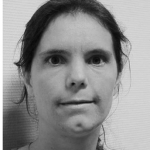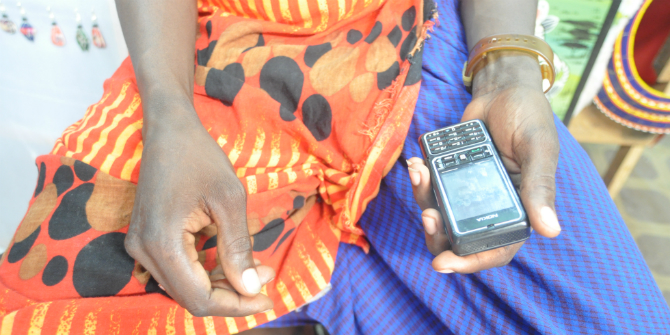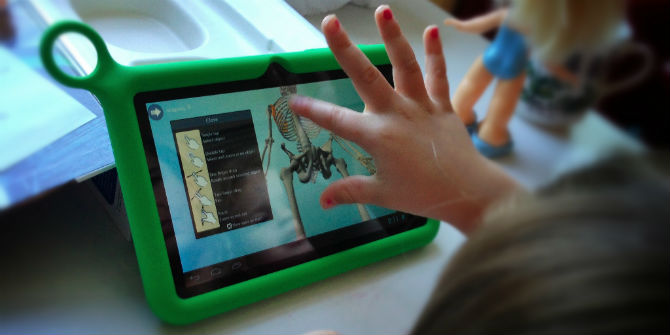 Griet Steel explores women’s digital connections in Sudan, where women’s physical mobility is very much restricted as a result of traditional gender norms. Griet explores the significance of smartphones in family relationships across physical distance and discusses the associated limitations and possibilities for empowerment. Griet is a cultural anthropologist and postdoctoral fellow at KU Leuven the who works on new technologies in urban Africa.
Griet Steel explores women’s digital connections in Sudan, where women’s physical mobility is very much restricted as a result of traditional gender norms. Griet explores the significance of smartphones in family relationships across physical distance and discusses the associated limitations and possibilities for empowerment. Griet is a cultural anthropologist and postdoctoral fellow at KU Leuven the who works on new technologies in urban Africa.
On a tremendously hot afternoon in Khartoum, I am soaking up the freshness of one of the only air-conditioned rooms in my Sudanese family’s compound when my mother-in-law’s mobile phone suddenly jolts to life. Even before she answers the phone we instinctively start to dance and sing to the Sudanese pop song that is her ringtone. This scene resembles the way mobile phones have brought joy and happiness as well as possibilities for increased global connectivity into daily family life in Sudan.
Shrinking spaces: migration and online connectivity
After my husband migrated to Chad about 20 years ago, weeks and even months passed before he had any contact with his family in Sudan. Back then communication with his mother was limited to a fixed line at his sister’s office, with sporadic contact. Once phones were able to match the mobility of people, their contact changed drastically.
For the past few years, and since she has had a mobile phone, my mother-in-law is in better contact with her three children as well as her three grandchildren living abroad. Although she does not call frequently, simply having the possibility of calling when she feels like it has significantly decreased the vast physical distance between them.
Yet with an older mobile phone, my mother-in-law maintains a digital disadvantage in comparison with her children who have a plethora of polymedia in their hands to watch funny videos, to instant message, or to exchange pictures on Facebook and Instagram. While they do not need brokers to successfully navigate the smartphone, my mother-in-law still depends on the assistance (and the smartphones) of her children to participate in the family WhatsApp group to instantly exchange animated information on their turbulent daily lives in Saudi Arabia, the UK, Belgium and Sudan.
Expanding spaces: female online entrepreneurship
In contrast, the WhatsApp groups that I found during my research are set up for other, more economically oriented, reasons. Instead of exchanging images of the daily undertakings of family members living at home and abroad, the online entrepreneurs I worked with exchange images of commodities they wish to sell though the internet. In line with the increasing popularity of smartphones, ever more Sudanese women – and mothers in particular – are using digital media to sell Western garments and fashion accessories as well as locally concocted perfumes and cosmetics.
Most of these online vendors do not physically move to run their businesses. Instead, smartphones and applications like WhatsApp create a space where they can simultaneously keep an eye on their children and be in continuous interaction with the outside world. For these women, online interaction has shaped the first contours of a worldwide yet home-based economic activity – a place where business now can be combined with the social expectations held of Sudanese mothers.
When I asked about the core value of their online businesses, the vendors do not necessarily point to profitability or other economic benefits. To them, the social aspect of the business turns out to be more important as it helps distract them from the social isolation of being a housewife. As a result of their online businesses, these vendors have cultivated an active social network with women across the globe with whom they are in permanent contact, for both economic as well as social reasons.
Remaking spaces through global connection
More than 1.2 million Sudanese migrants live abroad. While smartphones have not reduced the actual physical distance between the Sudanese and their diaspora, new communication technologies have simultaneously shrunk as well as expanded spaces of social and economic interaction, especially for women. As one of the online vendors once observed:
When you have a smartphone, you have the whole world in your hands.
Although this metaphor is used across the globe to express the advantages of digital connection, it has a special connotation in Sudan where women’s physical mobility is very much restricted as a result of traditional gender norms. The expression illustrates that women no longer have to move outdoors to be in connection with the outside world. As such, and as argued in a post by a researcher in Pakistan, internet access might actually help to maintain social norms that keep women from the public sphere. At the same time, women’s digital connections transmit the emotional and economic ties that bind family and friends as well as clients and consumers across a geographical scale. As a result, the ability to strengthen their positions in the home as well as in society might indeed empower Sudanese women after all.






